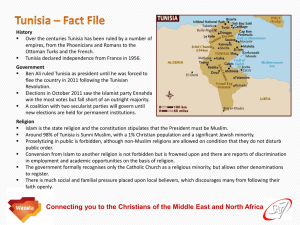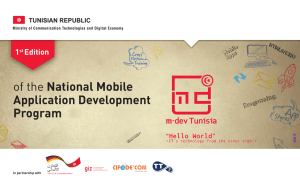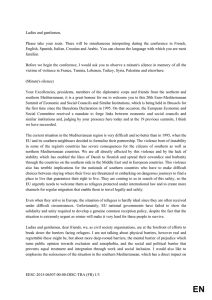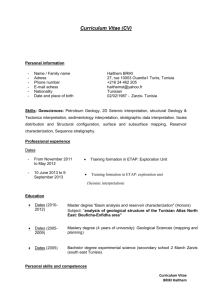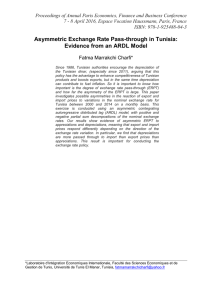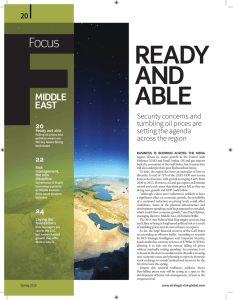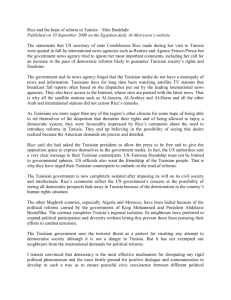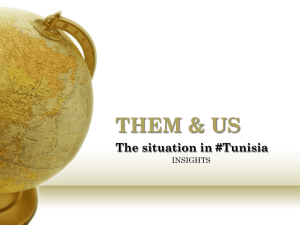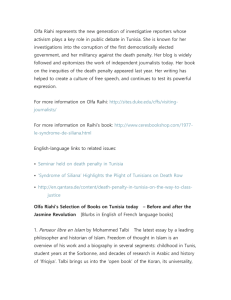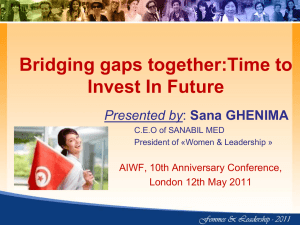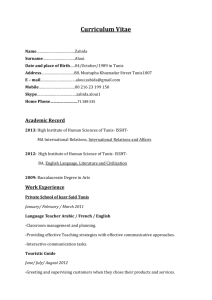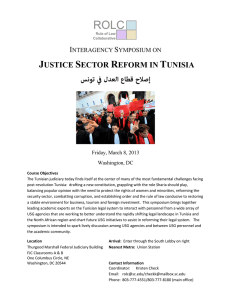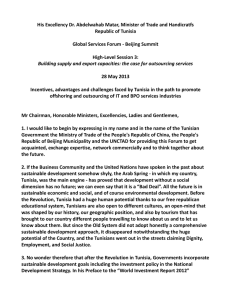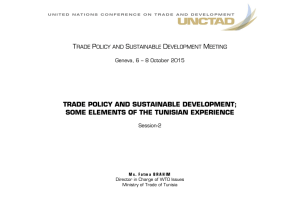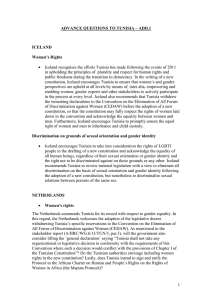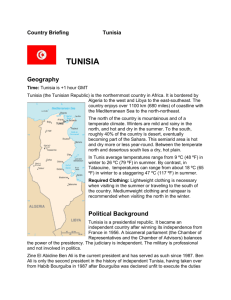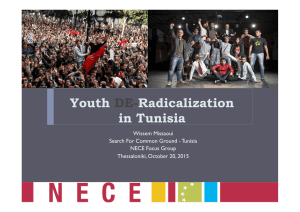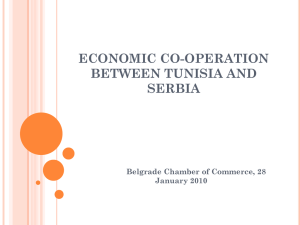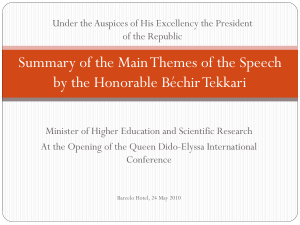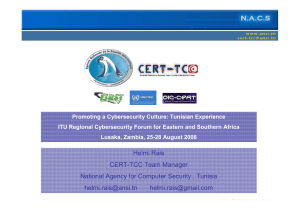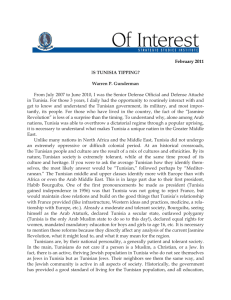Introduction Speech - EESC European Economic and Social
advertisement
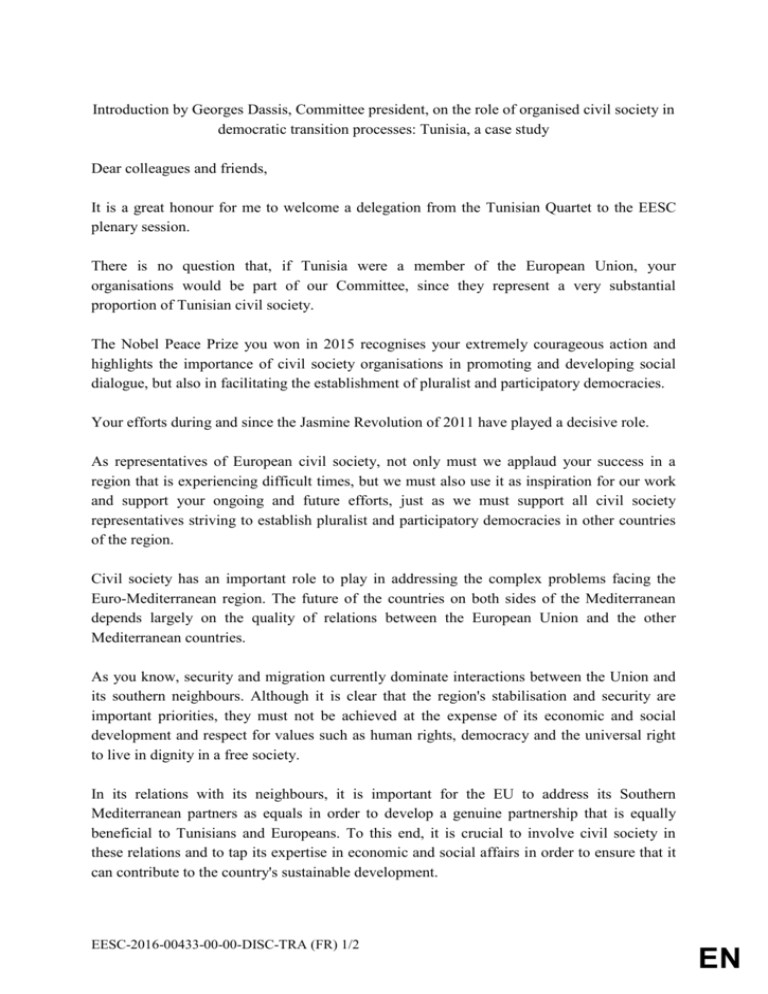
Introduction by Georges Dassis, Committee president, on the role of organised civil society in democratic transition processes: Tunisia, a case study Dear colleagues and friends, It is a great honour for me to welcome a delegation from the Tunisian Quartet to the EESC plenary session. There is no question that, if Tunisia were a member of the European Union, your organisations would be part of our Committee, since they represent a very substantial proportion of Tunisian civil society. The Nobel Peace Prize you won in 2015 recognises your extremely courageous action and highlights the importance of civil society organisations in promoting and developing social dialogue, but also in facilitating the establishment of pluralist and participatory democracies. Your efforts during and since the Jasmine Revolution of 2011 have played a decisive role. As representatives of European civil society, not only must we applaud your success in a region that is experiencing difficult times, but we must also use it as inspiration for our work and support your ongoing and future efforts, just as we must support all civil society representatives striving to establish pluralist and participatory democracies in other countries of the region. Civil society has an important role to play in addressing the complex problems facing the Euro-Mediterranean region. The future of the countries on both sides of the Mediterranean depends largely on the quality of relations between the European Union and the other Mediterranean countries. As you know, security and migration currently dominate interactions between the Union and its southern neighbours. Although it is clear that the region's stabilisation and security are important priorities, they must not be achieved at the expense of its economic and social development and respect for values such as human rights, democracy and the universal right to live in dignity in a free society. In its relations with its neighbours, it is important for the EU to address its Southern Mediterranean partners as equals in order to develop a genuine partnership that is equally beneficial to Tunisians and Europeans. To this end, it is crucial to involve civil society in these relations and to tap its expertise in economic and social affairs in order to ensure that it can contribute to the country's sustainable development. EESC-2016-00433-00-00-DISC-TRA (FR) 1/2 EN For this participation to be feasible and fruitful, civil society organisations must be free to meet, speak to each other and express their views openly. This means that, in its relations with governments, the EU must apply its principles of conditionality in all agreements. The EU has recently opened negotiations with Tunisia with a view to signing a deep and comprehensive free trade agreement. It is vital for civil society be able to participate in discussions relating to this agreement. As you know, the Committee organises advisory groups in the context of certain free trade agreements between the EU and third countries, and we will also offer the Commission our services for this agreement. We are also working on an opinion on the review of the neighbourhood policy, in which we will stress the need to involve civil society in EU policies relating to its southern neighbours. Dear colleagues and friends, However gratifying it might be for civil society organisations to receive a Nobel Prize, we must not lose sight of the difficult situation in the region and in Tunisia. The attacks Tunisia has suffered and the strained economic and social situation mean that an intense effort will be required before the Tunisian people can reap the benefits of the Jasmine Revolution. Due to my trade union experience, I am very used to social dialogue so I know just how difficult negotiations can be. The ongoing discussions in Tunisia are important and we hope that they will lead to a satisfactory solution for all partners involved. I hope that the commission for sustainable development and the rights of future generations, due to be established in Tunisia, will be representative of all the civil society organisations concerned, including social and economic stakeholders. We stand ready to support the development and work of this and any other institution that is similar to our Committee. We are convinced that structured dialogue between civil society organisations and governments is crucial to achieving the type of economic development that brings sustainable social cohesion. We will continue to support you in your future efforts with the same enthusiasm and commitment as in the past. I wish you every success in your work and reiterate our support for your efforts. _____________ EESC-2016-00433-00-00-DISC-TRA (FR) 2/2
